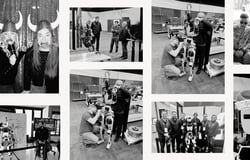What we’re doing isn’t easy, but nothing worth doing ever is.
We envision a future powered by robots that work seamlessly with human teams. We build artificial intelligence that enables service robots to collaborate with people and adapt to dynamic human environments. Join our mission-driven, venture-backed team as we build out current and future generations of humanoid robots.
As the TLM, Robotics Hardware Engineering, you’ll be responsible for defining and delivering the physical architecture of our robots. You will lead component selection, hardware design, and integration, while working closely with contract manufacturers to assemble robots at scale. You’ll validate performance and reliability, root cause field issues, and ensure our hardware platform evolves with both customer needs and operational demands. This role is based in Austin, TX and requires close collaboration across hardware, software, operations, and manufacturing.
Key Responsibilities- Define overall robot hardware architecture, including compute, sensors, actuators, power, and communication systems. This work will span multiple form factors including humanoid robots.
- Lead component selection (sensors, actuators, compute modules, power units, comms, cameras, LIDARs, etc.), balancing performance, cost, reliability, and manufacturability.
- Own end-to-end hardware design, bring-up, and integration with embedded and robotics software teams.
- Oversee technical relationships with contract manufacturers. Define technical requirements and tolerance for CM to meet build quality and manufacturability.
- Develop and execute validation and reliability testing plans for full robot systems and subsystems.
- Support Operations in developing and maintaining hardware-in-the-loop (HIL) test benches and production validation pipelines.
- Support Ops as needed in Root Cause Analysis and issue resolution of current platform.
- Leverage root cause analysis of field hardware issues and drive preventive actions into future designs.
- Collaborate with cross-functional leaders (AI, embedded software, product, operations) to align hardware roadmap with company goals.
- Document architecture, component specifications, and test results for internal and external stakeholders.
- Mentor junior engineers and contribute to building a strong hardware engineering culture.
- Master’s or PhD in Mechanical Engineering, Electrical Engineering, Robotics, or related field.
- 8+ years of experience in robotics or autonomous vehicle hardware, mechatronics, or electromechanical system design.
- Proven leadership experience: managed technical teams in hardware systems with AI/robotics eg. AVs or robots.
- Experience designing and validating robotic systems or other complex hardware platforms.
- Deep knowledge of sensors (IMUs, cameras, LIDARs), actuators, compute platforms, and power systems.
- Experience with reliability testing, validation protocols, and failure analysis, eg Weibull analysis (for HW component life cycle) and FMEA (for design improvements and manufacturability).
- Hands-on experience working with manufacturers and suppliers (DFM, assembly, quality control).
- Strong debugging skills: able to root cause system-level hardware issues in fielded robots.
- Familiarity with HIL systems and test automation frameworks.
- Proficiency in CAD, schematic design, and system-level architecture documentation.
- Excellent communication skills for cross-functional leadership and external supplier engagement.
- Prior experience in a startup or fast-moving product development environment.
- Ability to work onsite in Austin, TX.
Top Skills

What We Do
We are a human-centered robotics company. Our mission is to make technical advances towards robots and humans working together side by side, with an emphasis on human-centric design. Diligent Robotics is developing a suite of artificial intelligence that enables robots to collaborate with and adapt to humans in everyday environments.
Our service robots are designed to participate and work together with teams of humans. Our first product is a hospital service robot that can assist clinical staff with logistical tasks, allowing them to spend more of their time on direct patient care, improving patient satisfaction, quality of service, and safety.









